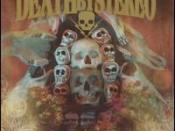Concept of Reading
Freeman's chapter concerning ethics in end of life decisions seemingly suggests that moral men tend to make moral decisions. If this statement is taken to be truth, what would follow? How do we as a society define what makes a man moral? Societies and cultures vastly differ; therefore, how can one decide on morality outside the context of environment?
Even though I felt the author made some valid points, I was dismayed about the lack of personalization and empathy toward the grieving. Even though death is something that all will face, people grieve differently and no one should be made to feel that they "are not doing it right."
I chose this chapter because it addresses questions to which many have few, if any, answers. I continue to be awe-stricken as to how many people view this issue as something that needs to be legislated. The way in which we view life and death is extremely personal and should be an individual and their family's decision.
Practice Importance
Dealing with death will inevitably be a part of your career as a social worker. One must be cognizant of their feelings about dying in order to effectively assist our clients. One's own mortality is brutally evident when dealing with hospice or related fields; therefore, one must be vigilant in maintaining the appropriate boundaries and detachment necessary. Death can be a sensitive subject for many people, so it takes a certain personality to be able to deal with death on a daily basis.


